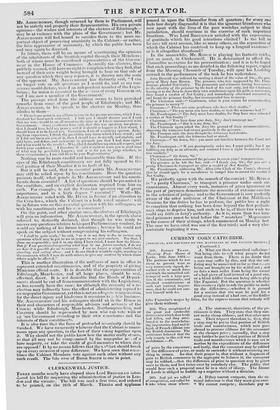CLERKENWELL JUSTICE.
THREE months nearly have elapsed since Lord BROUGHAM intro- duced his bill for improving the administration of justice in Lon- don and the vicinity. The bill was read a first time, and ordered to be printed, on the 2fith of March. Thanks and applause poured in upon the Chancellor from all quarters; for every one feels how deeply disgraceful it is that the ignorant blunderers who now sport with the lives of the poor wretches subject to their jurisdiction, should continue in the exercise of such important functions. Was Lord BROUGHAM satisfied with the expressions of gratitude which his good intentions elicited ? Is the bill to lie over till next session, like so many others, on the reputation of which the Cabinet has contrived lo keep up a languid existence? or is it altogether abandoned?
In the meanwhile, Mr. ROTCH is playing his fantastic tricks, just as usual, in Clerkenwell. He is determined to afford the Chancellor no excuse for his procrastination; and it is to be hoped that such proceedings as are detailed in the following report, copied from the Morning Chronicle of Tuesday, will spur his Lordship onward to the performance of the task he has undertaken.
John Driscoll was indicted for stealing a shawl of the value of lOs., the pro. petty of Mary Ann Brown. The prisoner, who was supported by Mr. Pren- dergast, pleaded Not Guilty. The prosecutor and witnesses having been sworn to the identity of the prisoner by the back of his coat only, and the Chairman leaving it to the Jury to draw their own conclusions upon his guilt or innocence, they found a verdict of Not Guilty ; and immediately afterward retracted it, and found the prisoner Guilty, but recommended him to mercy. The Chairman said—" Gentlemen, what is your reason for recommending the prisoner to mercy ?v
Foreman—" There are sonic gentlemen who hare their doubts." Chairman—" Do you mean you have doubts, or that the witnesses had ?" Mr. Prendergast—" The Jury must have doubts, for they have once returned a verdict of Not Guilty !"
Chairman—" You have done your duty, Sir ; don't interrupt me." Mr. Prendergast—" But it is my duty, Sir." The Chairman again asked the Jury the ground of their recommendation; observing the witnesses had sworn positively to the prisoner.
The Foreman said, the Jury thought the witnesses had doubts.
Mr. Prendergast said, the witnesses had so stated. Chairman—" Sit down, Sir : you must not interfere between the Court and the Jury."
Mr. Prendergast—" If you peremptorily order me, I must yield ; but I am fulfilling my duty as an advocate, and contend I have a right to remark on the two verdicts."
Chairman—" Sit down, Sir."
The Chairman then sentenced the prisoner to seven years transportation.
The prisoner as he left the bar, said—" I thank von, Sir; but you are a pretty Chairman to transport me after a verdict (y. Not Guilty." Mr. Prendergast, addressing Mr. Allen (the Clerk of the Court), observed that he should apply for a mandamus to compel him to record the verdict of Not Guilty.
We perfectly agree with the remark of the convict : Mr.ROTCH
is "a pretty Chairman," to transport a prisoner under such cir-
cumstances. Almost every week, instances of gross ignorance on the part of jurymen demonstrate the necessity of extreme caulion in the selection of judges; and as the Government is now perfectly aware of the utter unfitness of the Chairman at the Middlesex Sessions for the duties he has to perform, the public has a right
to complain that nothing has been done beyond the first prelimi- nary steps to deprive him, and such as he is, of their (we wish we could say little or brief) authority. As it is, more than two hun- dred prisoners must be tried before the " mistaken " Magistrates in the course of their sittings, which commenced on Monday last The case we have cited was one of the first tried; and a very cha- racteristic beginning it was.






















 Previous page
Previous page